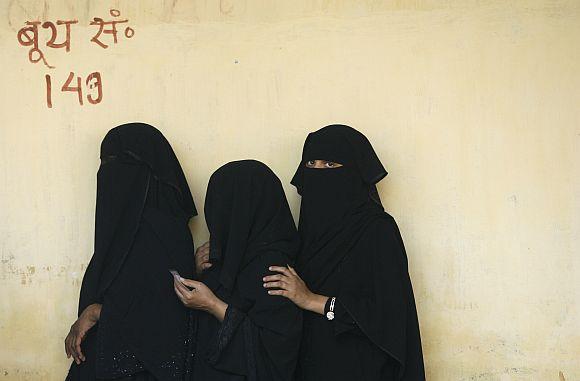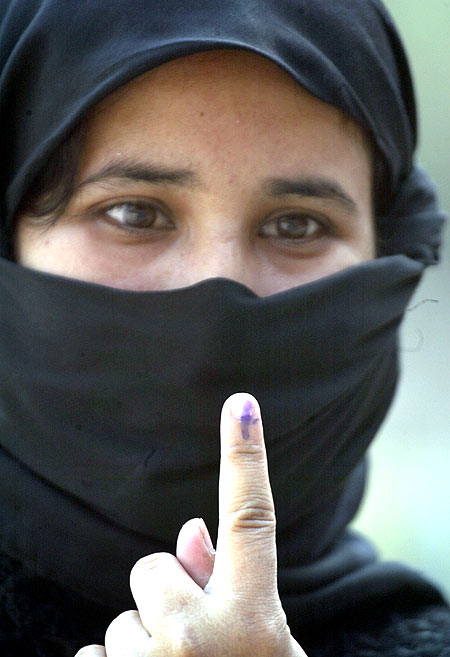 | « Back to article | Print this article |
The man with UP's most challenging task
'Holding elections in UP is a challenging task. If UP had been a country, it would have been the sixth largest country in the world! This is the scale at which we hold elections,' Umesh Sinha, chief electoral officer, Uttar Pradesh, tells Sheela Bhatt.
Umesh Sinha occupies a very important, but unenviable, seat of power in Lucknow.
As the chief electoral officer of Uttar Pradesh, he has the task of ensuring that 125 million voters in the state exercise their vote without hindrance or fear.
"Elections cannot be viewed as an isolated event, but are a part of a holistic process for promoting democratic governance," says Sinha who has conducted a state-wide exercise to enroll new voters that has added 14 million voters to the voter's list -- with 40 million voters below the age of 40.
Sinha heads a massive infrastructure which is trying hard to inspire 5.4 million first-time-voters to participate in the democratic exercise. He spoke to Sheela Bhatt in Lucknow about the fascinating logistics of conducting an election that will allow the people of UP to voice their political choice.
On what a huge exercise Election 2012 is:
Holding elections in UP is definitely a challenging task. It's also very interesting.
If you see the scale of Uttar Pradesh, it has a large base of voters -- more than 12.5 crore (125 million) voters.
There are 403 constituencies which will go to the polls. We have made exhaustive arrangements -- because if UP had been a country, it would have been the sixth largest country in the world!
And if you compare the countries and its voters, even then it would have been the twelfth largest country in the world.
This is the scale at which we hold elections.
There are massive arrangements everywhere. There are 75 districts in which the district election officer conducts the election.
There are 403 assembly constituencies and 80 Lok Sabha seats.
The task starts from preparing the voters roll or the electoral roll. There has been a massive response this time and new voters have registered in large numbers.
In the 18-19 age group category, there are about 54 lakh (5.4 million) voters who are going to vote for the first time.
Even when you compare the age group below 30, we have about 4 crore (40 million) voters. So 1/3 of the voters are below 30 years of age.
We introduced an outreach programme in educational institutions which gave students the opportunity to register at the college level itself. We established good partnerships with the National Service Scheme and National Cadet Corps this time and have about 2.5 lakh (250,000) student volunteers who took up this responsibility to register young voters.
The students organised their own quiz shows, poster competition, painting competition, slogan and song writing etc. So it has been going on for the last one year.
Please click Next to read further...
Voting is not only a right but a reponsibility
On the awakening of the UP voter:
We first made an analysis of the electoral population issue and also of the new age group -- how many people should be registering etc.
When we had started our work, we had an electoral to population ratio of 34 per cent, which should have been 62 per cent. In about one year's time we were able to achieve 62 per cent. Almost, at the level of saturation.
Even among the new voters we have done the largest number of registrations, probably, almost equal to what has been done in the whole country. We could achieve this because of the different kinds of outreach programmes.
UP has been known for the urban apathy of voters. The percentage of polling has been very low here. On an average it has been about 46 to 48 per cent in assembly elections.
In urban areas, in some places, it is even less than 30 per cent.
This time there is such a good response. I am sure we are going to break all previous records. I am sure 8, 9 crores (80 million, 90 million people) should actually be voting.
The media has also been very proactive. The Election Commission has a special mandate called SVEEP -- Systematic Voters Education Electoral Participation, under which they have launched a systematic programme for electoral awareness.
The declaration of National Voters Day on January 25 has done a wonderful job. We had a massive programme on National Voters Day 2011, where we took a pledge at 88,000 polling centres. The pledge is on our Web site.
The Election Commission of India, in its diamond jubilee celebration year, had declared January 25 as the day for voters. This is basically a day when we want to buiild awareness to empower voters, to know that the right they have is very important for them.
This is not only a right, but also a very important responsibility and duty.
We encourage young students, especially in primary and secondary schools, to motivate their parents, uncles, aunties and grandparents to go and vote. This is a massive campaign which has been going on. Many NGOs have joined hands, along with resident welfare associations.

